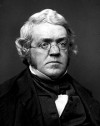William Makepeace Thackeray

William Makepeace Thackeray /ˈθækəri/ (18 July 1811 – 24 December 1863) was an English novelist of the 19th century. He was famous for his satirical works, particularly Vanity Fair, a panoramic portrait of English society.
Thackeray began as a satirist and parodist, writing papers with a sneaking fondness for roguish upstarts like Becky Sharp in Vanity Fair and the title characters of The Luck of Barry Lyndon and Catherine. In his earliest works, writing under such pseudonyms as Charles James Yellowplush, Michael Angelo Titmarsh, and George Savage Fitz-Boodle, he tended towards the savage in his attacks on high society, military prowess, the institution of marriage, and hypocrisy.
Title-page to Vanity Fair, drawn by Thackeray, who furnished the illustrations for many of his earlier editions.
One of his earliest works, "Timbuctoo" (1829), contained his burlesque upon the subject set for the Cambridge Chancellor's medal for English verse, (the contest was won by Tennyson with "Timbuctoo"). His writing career really began with a series of satirical sketches now usually known as The Yellowplush Papers, which appeared in Fraser's Magazine beginning in 1837. These were adapted for BBC Radio 4 in 2009, with Adam Buxton playing Charles Yellowplush.[5]
Between May 1839 and February 1840, Fraser's published the work sometimes considered Thackeray's first novel, Catherine, originally intended as a satire of the Newgate school of crime fiction but ending up more as a rollicking picaresque tale in its own right.
In The Luck of Barry Lyndon, a novel serialised in Fraser's in 1844, Thackeray explored the situation of an outsider trying to achieve status in high society, a theme which he developed more successfully in Vanity Fair with the character of Becky Sharp, the artist's daughter who rises nearly to the heights by manipulating the other characters.
He is best known now for Vanity Fair, with its deft skewerings of human foibles and its roguishly attractive heroine. His large novels from the period after this, once described unflatteringly by Henry James as examples of "loose baggy monsters," have faded from view, perhaps because they reflect a mellowing in the author, who became so successful with his satires on society that he seemed to lose his zest for attacking it.
 čeština
čeština Deutsch
Deutsch français
français magyar
magyar polski
polski русский
русский English
English Azərbaycan
Azərbaycan беларуская
беларуская italiano
italiano қазақ
қазақ Nederlands
Nederlands português
português slovenčina
slovenčina español
español 中文
中文 ქართული
ქართული







